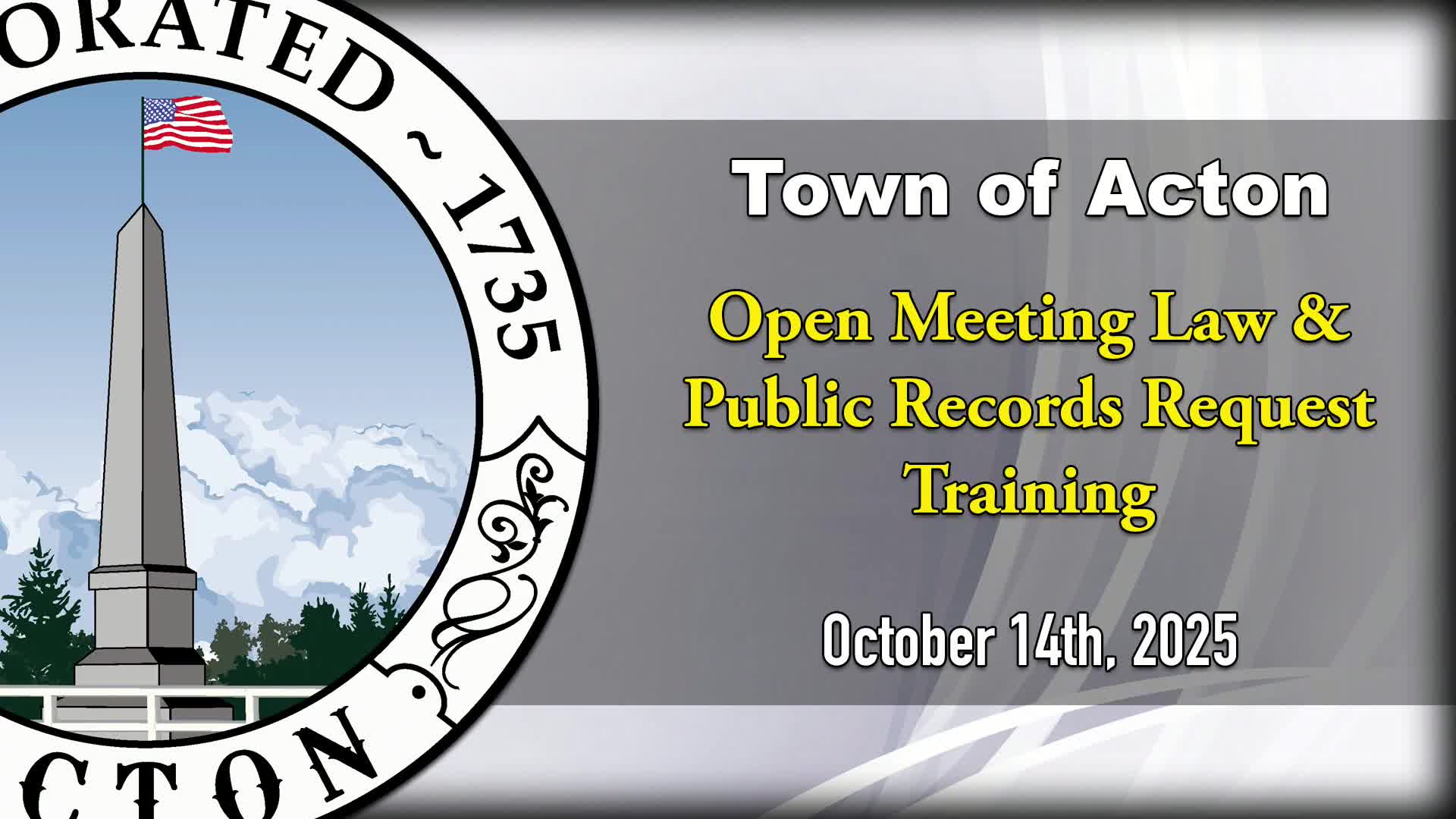Acton holds open meeting law, public records and ethics training for volunteers
Get AI-powered insights, summaries, and transcripts
Subscribe
Summary
Town Councilor Nina Pickering Cook led a training for Town of Acton volunteers covering the open meeting law, public records obligations and the state ethics law, emphasizing posting, minutes, public-records timelines and limits on electronic deliberations.
Town Councilor Nina Pickering Cook led an evening training for Town of Acton volunteer board and committee members that reviewed the town’s responsibilities under the Open Meeting Law, the Public Records Law and the State Ethics Act.
Cook opened by stating the fundamental rule: “any deliberation by a quorum of a public body must take place in a meeting,” and said the session would focus on definitions, common pitfalls and practical steps for compliance.
The training stressed several recurring compliance points: meeting notices should be posted at least 48 hours in advance (excluding Saturdays, Sundays and legal holidays); draft and final minutes must be prepared and approved promptly; public records requests must receive an initial response within 10 business days; and certain communications among a quorum outside a public meeting can count as prohibited deliberation. Cook cautioned volunteers that electronic communications are a particular risk, advising “Almost never hit reply all, ever.”
Cook reviewed how a quorum and a “public body” are defined and warned that ad hoc two-or-more member working groups can become subcommittees subject to posting, minutes and open-meeting requirements unless the task is delegated to a single member or to staff. She explained that a single member may gather information or consult a nonquorum informal working group, but two or more members acting together on a public duty create a subcommittee that must comply with the Open Meeting Law.
On meeting notices, Cook said boilerplate agendas such as “new business” are no longer sufficient. She urged chairs to describe agenda items in enough detail so members of the public can determine whether to attend — for land-use matters, that includes providing the project address. Emergency meetings are permitted only in narrow circumstances where waiting 48 hours would undermine the meeting’s purpose.
The training covered minutes and records: meeting minutes should summarize discussions so that someone who did not attend can understand why a decision was reached; minutes for open sessions must be approved promptly (the attorney general’s guidance was cited as meaning within 30 days or three regular meetings, whichever is shorter); and audio/video recordings do not substitute for written minutes. Cook said documents used at a meeting should be listed with minutes and that many boards use the town’s DocuShare system to post materials publicly.
On executive sessions, Cook noted there are 10 statutorily authorized purposes and that three of those require an additional showing that public discussion would be detrimental to the town’s position (for example, certain litigation and property-acquisition discussions). She recommended using the town clerk’s office script when convening executive sessions and reminded members that executive-session minutes must be kept separately and reviewed when the confidential purpose ends.
For public records, Cook explained that any writing related to public duties — including emails and texts — can be public records regardless of which account was used. She said the town has software to log and track requests and encouraged volunteers to route records requests through the town clerk’s office so responses meet statutory timelines and redaction obligations. She reminded members that personally held committee files should be turned into town hall so records are preserved centrally.
On ethics, Cook distinguished “actual” conflicts (direct financial interest or close family members) from perceived conflicts (longstanding friendships or expressed political views). She said officials must not use their public position for private benefit and urged recusal or filing the State Ethics Act disclosure (Form 23B) when a reasonable person might perceive a conflict.
The session included a question-and-answer period in which staff representatives directed volunteers to templates, posting procedures and contacts at the town clerk’s office for posting minutes and for obtaining a script to convene executive session. Cook and staff repeatedly advised volunteers to contact town staff or town counsel when complaints or complex public-records requests arise.
The training aimed to reduce inadvertent violations by emphasizing practical steps: avoid multi-member substantive email exchanges; post documents to DocuShare if substantive material must be shared before a meeting; have one designated recipient aggregate edits to draft minutes; and consult the town clerk or town counsel early when a complaint is filed.
Town staff said updated slides and templates would be distributed to participants after the session.
